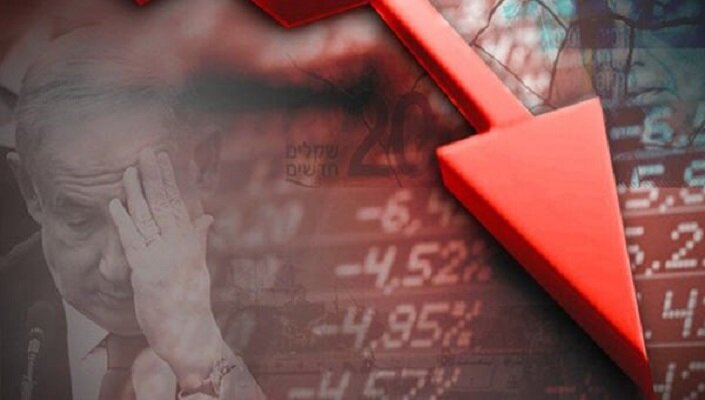The free fall of the Zionist economy and the flight of investors

Mehr News Agency, Intergroup International: Border clashes with Hezbollah Lebanon in the north of occupied Palestine has become a nightmare for the economy of the Zionist regime. While the regime is still grappling with the economic consequences of the Gaza war, the opening of the northern front has dealt a fatal blow to the economic infrastructure, and what the Hebrew-language media is calling an economic collapse is closer to reality than ever. .
Northern occupied Palestine, which was once known as the economic hub of the Zionist regime, has now turned into a deserted area. The widespread evacuation of settlers, the closing of factories and production centers, and the flight of investors have completely changed the face of this region. The Central Bank of the Zionist regime, which previously tried to reduce the deterioration of the situation by presenting promising statistics, is now officially speaking of an unprecedented economic crisis.
Hi-tech industries, which were always known as the symbol of economic success of the Zionist regime, are now on the verge of collapse. The widespread call-up of the reserve forces, a significant part of which was employed in these industries, has practically led to the closure of many technology companies. Economic experts warn that compensation for these damages will take years, even if the conflicts stop immediately. The situation in the agriculture and tourism sector in the north is also worse. Tourism and agriculture, which were once the main source of income for the residents of this area, are now completely paralyzed. Farmers who have been forced to leave their fields have not only lost this year’s crop, but are also worried about an uncertain future. Hotels and tourist centers, which once hosted foreign tourists, have now become shelters for internally displaced persons and are completely out of the profit cycle.
Meanwhile, the political divisions in Netanyahu’s war cabinet are getting deeper day by day. Benny Gantz and other members of the cabinet, who tried to hide the differences in order to maintain cohesion, now openly talk about the economic disaster and hold Netanyahu directly responsible for this situation. The street protests, which this time centered on economic demands, show that the Zionist society can no longer bear the costs of this war of attrition.
With the continuation of conflicts in the north and the increase in the scope of economic damages, it seems that the Zionist regime is caught in a trap from which it is becoming more and more difficult to get out. On the one hand, the regime cannot escalate the conflicts, because it knows that Hezbollah’s response could deal the final blow to its shaky economy, and on the other hand, retreating and accepting defeat could lead to the collapse of the cabinet and even wider political changes. This complicated situation, which is the result of miscalculations by the Zionist leaders, has now reached a point where even the western supporters of this regime are worried about its future. The continuation of this process can lead not only to economic collapse, but also to fundamental changes in the political and social structure of this regime.
What is happening in the economy of the Zionist regime today is beyond a simple economic crisis. This regime, which once claimed to become the economic pole of the region, is now facing very deep and fundamental challenges. The gradual collapse of the economic structures that were formed over decades, along with the intensification of political and social divisions, show that this regime is facing a multifaceted crisis. Historical experience has shown that the economy is the Achilles heel of the Zionist regime. In contrast to the military power that has been strengthened by the unwavering support of the West, the economy of this regime is extremely vulnerable. The continued conflict in the north has made this vulnerability more visible than ever. The flight of investors, the closure of businesses and widespread unemployment are only the outward signs of a deeper crisis.
The point to consider here is that even if the conflicts stop immediately, it will be very difficult, if not impossible, to return to the pre-war situation. The lost trust of foreign investors, serious damage to the economic infrastructure, and most importantly, the deep divide in the Zionist society, is a legacy that will not disappear even after the end of the war.
In such a situation, the Zionist regime is facing a complicated puzzle; It can neither end the conflicts, because that would mean accepting defeat and further weaken its political-security position, nor can it afford to continue the status quo, because the continuation of the conflicts could lead to a complete economic collapse. This complicated situation, which is the result of years of wrong policies and miscalculations, has now reached a point where even the closest allies of this regime, including the United States of America and the member states of the European Union, are worried about its future. The developments of recent months have shown that the equation of security versus prosperity, which has been the basis of policy making in this regime for years, has lost its effectiveness, and the Zionist society must prepare itself for fundamental changes in the very near future.
Amir Hossein Ebrahimi; Regional issues expert


